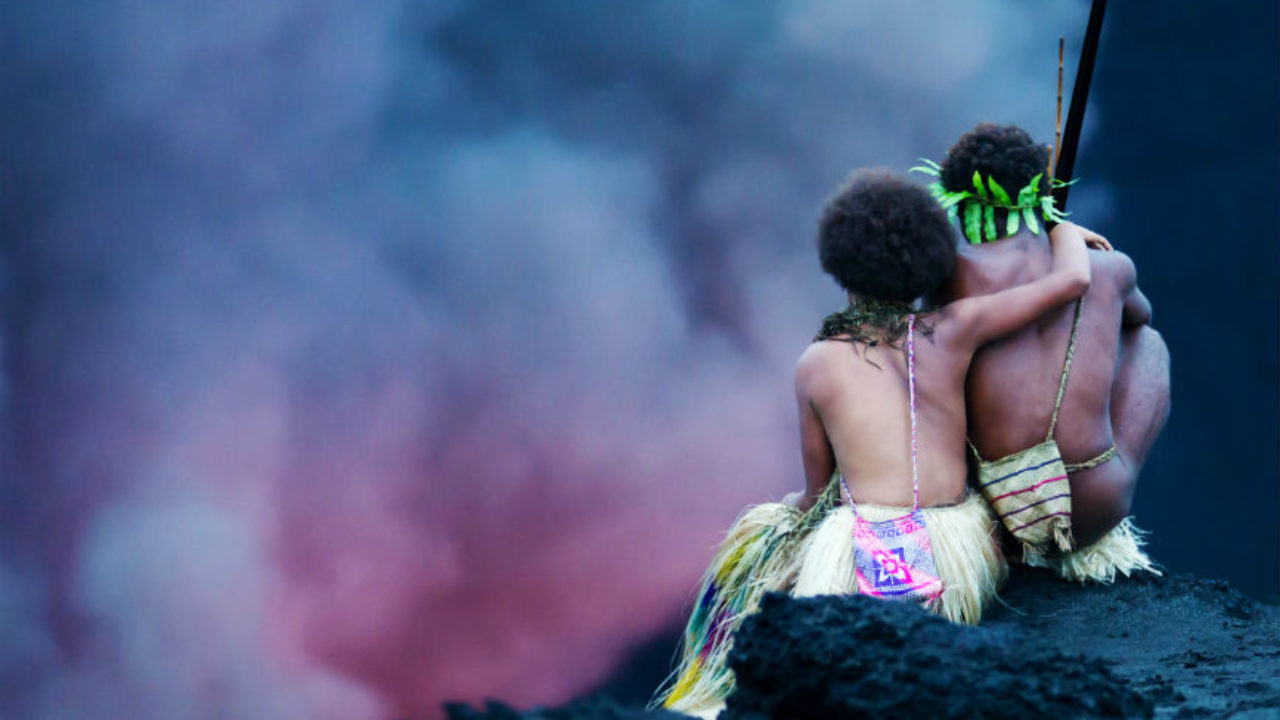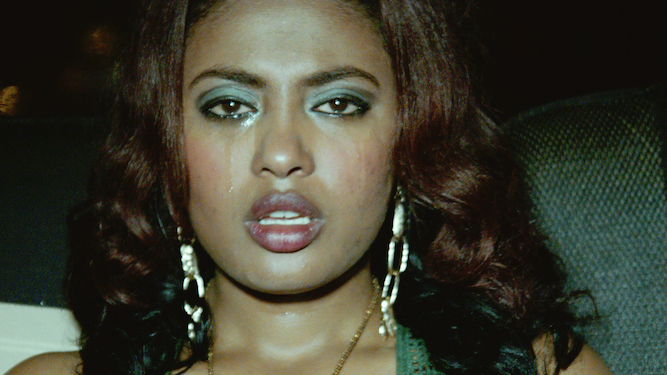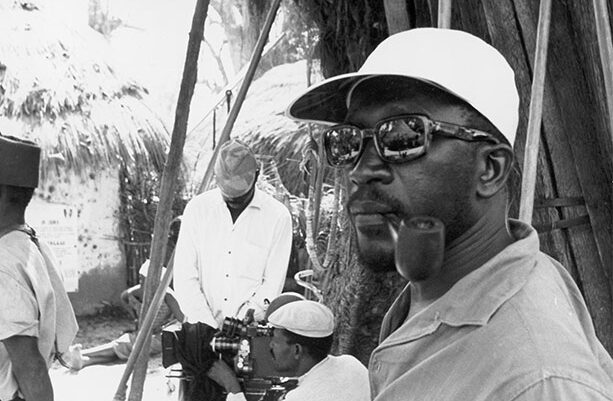2016 Statement
Modern Days, Ancient Nights: 50 Years of African Filmmaking
When Senegalese pioneer Ousmane Sembène premiered his masterpiece Black Girl at Cannes in 1966, it was the first time a Sub-Saharan feature film was accepted in the European cinema mecca. The international film world turned its head to Africa, and Sembène, “the father of African cinema” brought the highly regarded “Prix Jean Vigo” home to Dakar. The first generation of pan-African artists and activists used cinema as a platform to comment on and fight for their people’s rights. The world these men and women envisioned was composed of free, independent, equal, and solidary nations and individuals, and the universal language of cinema was a perfect means to inform, educate, and entertain both local and international audiences. 50 years later, historical and contemporary events make their dreams seem further away. Nevertheless, their personal and artistic commitment is a living model for the youth, who honor their legacy in the field of art and creation in our interconnected digital era.
Armed with their imagination, these fearless men and women continue the struggle of their ancestors, transforming film language in innovative and unexpected ways to forge new identities, find their way back home, and create new spaces to incite dialogue against injustice. Wars, migration and forced displacement are salient factors reshaping the face of the earth, concealing dramatic individual and collective stories. New languages, styles, genres, and narratives, stitched together with the richness of international references, pop culture, and vernacular traditions, bring to light an African-inflected world in constant change and mutation.
Under the banner Modern Days, Ancient Nights: 50 Years of African Filmmaking the 23rd edition of the New York African Film Festival honors the legacy of Sembène. The festival returns to New York to show film-lovers the most fascinating selection of narrative features, documentaries, and shorts from the African continent and the Diaspora. More than 50 works from over 25 countries display the exhilarating labor of a new generation of filmmakers working from the four corners of the world, enriching the growing patrimony of African cinema.


To celebrate the International Decade of People of African Descent, a carefully chosen group of feature films and documentaries emphasize the encounter and interchange between cultures, spaces and human beings. Centerpieces of the program are the enigmatic Tanna, a timeless epic fable set in the South Pacific, based on real events, with breathtaking cinematography; Price of Love by Hermon Hailay, an Ethiopian melodrama dealing with prostitution, poverty, and human trafficking; and Rain the Color Blue with a Little Red in it, an homage to Prince’s Purple Rain and the first-ever fiction film in the language of the Tuareg people. Ghana, South Africa and Nigeria complete the feature film section with the absorbing historical and allegorical narratives 76 and The Cursed Ones; While You Weren’t Looking, a melodramatic take on new queer identities; the one-man thriller Cuckold; and Pastor Paul, a surrealist and hilarious ghostly encounter between Nollywood and the West.
We pay tribute to the explosion of a new wave of original documentaries in the FSLC program with several present-day gems about the role of art as a revolutionary, healing, and social tool in Martha & Niki, an account of the friendship of the first female couple to become World Champions of Hip Hop; Intore (The Chosen) introduces us to prominent Rwandan artists who played a fundamental part after the genocide. As shown in Some Bright Morning: The Art of Melvin Edwards, the life and work of African-American sculptor M. Edwards has been uncompromised for five decades. The historical significance and current decline of cinema theaters in Kinshasa is the core of La Belle at the Movies. Finally, Manthia Diawara stages a conversation between Wole Soyinka and L. Sédar Senghor to reflect on the achievements and limitations of Négritude.
The need for old African practices, religions, and people to adapt once they touched the other side of the Atlantic is a sub-theme of the documentary section. Queen Nanny: Legendary Maroon Chieftainess goes deep into the legend and reality of Jamaica’s sole national heroine; we penetrate into Candomblé’s female rituals in Brazil in Yemanjá. Wisdom from the African Heart of Brazil; and In the Eye of the Spiral, the Haitian philosophy and aesthetics of spiralism will leave no one indifferent. In the meanwhile back on the continent, the constant quest for spirituality leads to an upsurge of newly created African Jewish communities in Black Jews: The Root of the Olive Tree.
We reach the heights of innovation in the short format. French-based African filmmakers cope with love through animation (The Sense of Touch), bold interviews (Towards Tenderness), and melodrama and comedy (Destino). Their peers based in New York offer a fluid emotional map of our adopted city. Both the indigenous Nigerian horror film Hex by Clarence Peters and Cédric Ido’s super hero revolutionary tale Twaaga (Invincible) from Burkina Faso, are not-to-miss experiences.
At Maysles Cinema, a handful of the newest African documentaries about hidden artistic traditions and silenced truths correct the official historical narrative of Africa. Too Black to be French? by Isabelle Boni-Claverie, examines structural racism in the cradle of humanism, while The Pharaohs of Modern Day Egypt by Jihan El-Tahri, gives us an exhaustive panorama of the land of the pyramids since independence. In our last stop at BAM Cinématek, stories of displacement, exile, and human contacts, as well as a series of films about the creative process of contemporary African artists, will be screened along with the thorough “authorized” biography SEMBENE! by Samba Gadjigo and the mesmerizing TGV by Moussa Touré, an unexpected train trip to the rhythm of Wasis Diop’s unforgettable soundtrack.

The 23 rd New York African Film Festival was organized by Dennis Lim, Director of Programming, Rufus de Rham and Dan Sullivan, Programmers, Film Society of Lincoln Center, Jesse Trussell, Programmer, BAMcinématek, Jessica Green, Cinema Director, Maysles Cinema, and Mahen Bonetti, Founder and Executive Director, African Film Festival, Inc. with Alimah Boyd, Francoise Bouffault, Beatriz Leal-Riesco, Hellura Lyle, and Dara Ojugbele.
Thanks are due to the AFF Board of Directors and Jane Aiello, Joan Baffour, Luca Bonetti, Rumbi Bwerinofa, Aminata Diop, Gabriele Donati, Jacki Fischer, Belynda Hardin, Thomas Allen Harris, Muriel Placet-Kouassi, Ulli Maier, Mariah McKenzie, Karen McMullen, Julie Mehretu, Junita Middleton, Ekwa Msangi, Kagendo Murungi, Don Perry, Mohammed Sillah, Alonzo Speight, Malika Lee Whitney, Cheryl Duncan & Company Inc. Public Relations, Kojo Associates and AFF’s volunteer team.

